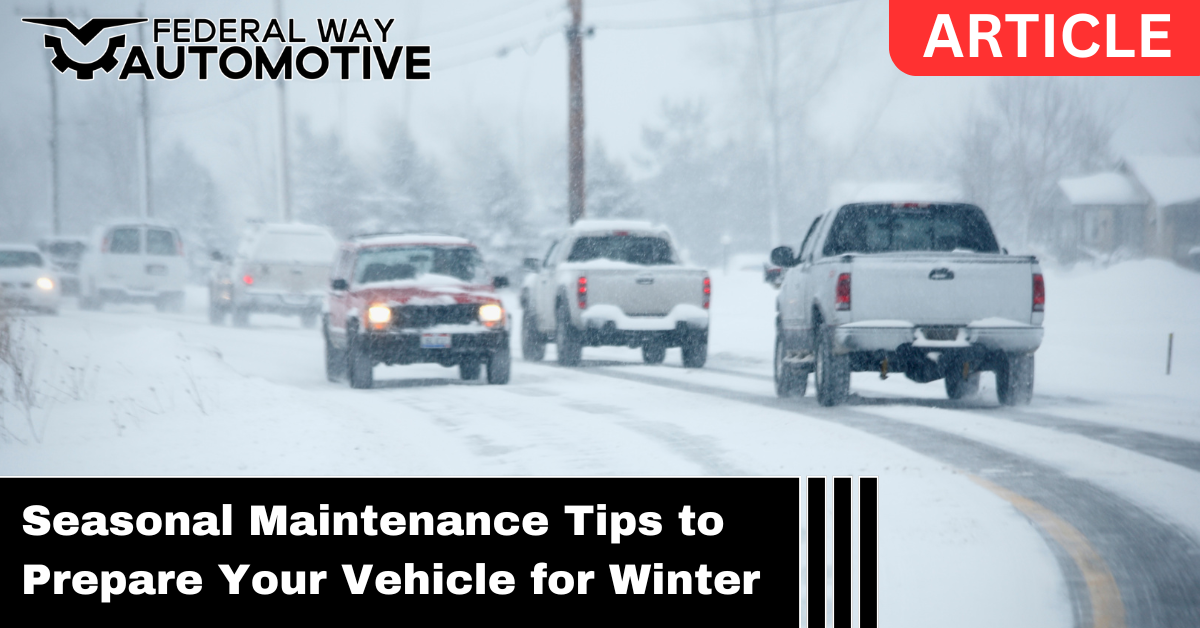Cold mornings, icy roads, and long nights — winter driving in the Pacific Northwest can put your car to the test. That’s why seasonal maintenance is so important.
At Federal Way Automotive, we see a spike in no-starts, weak batteries, frozen fluids, and traction issues every year — most of which could’ve been avoided with a little preventive care. Winter is hard on your vehicle, especially if you’re commuting, traveling, or parking outside overnight.
Here’s a checklist of the most important systems to inspect, service, or replace before the cold weather hits.
1. Test the Battery
Cold temperatures slow down your battery’s chemical reaction and reduce its power output — especially if it’s already weak or nearing the end of its life. If your battery is more than 3 years old, have it tested.
Signs of a weak battery include:
- Slow cranking on cold starts
- Dim headlights when idling
- Clicking sound when turning the key
- Dashboard lights flickering
We can load-test your battery, check the alternator’s charging performance, and replace either if needed to avoid mid-winter failures.
2. Check the Brakes
Slippery roads demand responsive brakes — and winter is no time to discover worn pads or sticking calipers.
Key items to inspect include:
- Brake pad thickness
- Rotor condition
- Brake fluid level and quality
- Signs of rust or corrosion
If your brakes are noisy, soft, or pulling to one side, have them looked at before the roads get worse. Catching problems now helps prevent expensive auto repairs later.
3. Inspect the Charging System
Your alternator has to work harder in cold weather, especially with your defroster, headlights, and heater running constantly. If it’s not charging properly, you could end up with a dead battery — even a new one.
We’ll check for:
- Output voltage under load
- Worn or loose belts
- Corroded battery terminals or grounds
If your battery keeps dying, your alternator might be the problem — not the battery itself.
4. Replace Engine Oil and Filter
Cold-weather oil changes are more than just routine — they help protect your engine during low-temperature startups.
Old oil thickens and becomes sluggish, which can:
- Delay engine lubrication
- Increase wear on startup
- Affect fuel economy
We recommend a winter oil change with the proper viscosity for your vehicle’s engine and climate.
5. Check Fuel System Health
During winter, condensation inside your gas tank can introduce water into your fuel pump and injectors. If you’ve ever had a hard start on a freezing morning, this could be why.
What we check:
- Fuel filter condition (if applicable)
- Signs of restricted flow or delayed starts
- Fuel injection system cleaning (if needed)
- Top off with fuel system additives (if recommended for your vehicle)
Keeping your tank at least half full also helps prevent freezing issues and moisture buildup.
6. Test the Heater and Defroster
You don’t want to find out your heat or defrost doesn’t work the day it drops below freezing. If your cabin isn’t warming up, or your windows stay foggy, you may have a blend door issue, low coolant, or a failing heater core.
We’ll check:
- Heater operation and air flow
- Coolant level and strength
- Cabin air filter condition
- Defrost vent function
Driving without visibility or heat isn’t just uncomfortable — it’s unsafe.
7. Inspect Wipers, Lights, and Fluids
Visibility is everything in winter.
Be sure to:
- Replace worn wiper blades
- Use winter-rated washer fluid
- Check that all exterior lights work
- Inspect for any leaking or frozen fluids
We’ll look over your coolant, brake fluid, transmission fluid, and power steering fluid to make sure everything’s topped off and safe in freezing temperatures.
8. Tires and Traction
Winter driving is all about grip — and your tires are the first line of defense. Even all-season tires lose effectiveness in cold weather if the tread is low.
We’ll inspect:
- Tread depth and wear patterns
- Tire pressure (drops in cold weather)
- Sidewall condition
- Alignment and rotation history
If needed, we’ll help you find the right winter tires or perform a rotation to extend tread life.
Seasonal Maintenance from Federal Way Automotive
At Federal Way Automotive, we’ve helped keep drivers safe through harsh winters for over 35 years. We perform complete seasonal maintenance and safety inspections designed to keep your vehicle reliable — whether you’re commuting to work or heading into the mountains.
From batteries and brakes to oil changes, fuel pumps, and charging systems, our ASE-certified team knows what your car needs when the temperature drops.
Call or schedule online — and ask about our winter specials!


